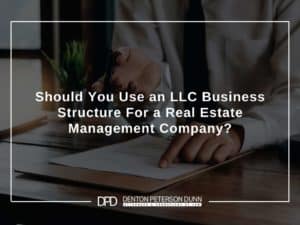
A limited liability company (LLC) is a commonly used business structure for a wide variety of businesses. In many cases, the LLC is the best structure for real estate management companies who want to take legal steps to reduce their liability while protecting themselves and their assets. An LLC can protect business owners and their companies from the risks of running a business, which can include lawsuits, problems with tenants, and unexpected tax problems. Forming an LLC is one of the most effective ways to reduce the risk of personal liability from running a real estate management business.
When you work with your Tempe business law firm to form an LLC, you are creating an entity that is separate from its members, including yourself. This means that the LLC – not you personally or any of your business partners – owns and manages both the business and its associated real estate. (Technically, co-owners of an LLC are not partners but co-owners usually referred to as “members.” Being a “partner” has a whole set of separate legal issues and is usually far less favorable for you from a liability standpoint.) Having the LLC as owner and manager of the real estate gives you and your co-owners plenty of flexibility as you manage your company and split profits.
There are other business structures that you can choose as well, each with their own benefits and disadvantages. It usually makes sense to speak with your Surprise business attorney about which type of business structure would be the best for your real estate management business. Some of the business structures are:
No matter which type of business structure you choose, you always have the option of purchasing business insurance for additional protection, but many real estate management companies find they prefer to form an LLC to reduce risk as much as possible.
One of the primary reasons that business owners form an LLC or other business structure is to limit their personal liability. If you do not have a legal business structure, your personal assets – including your home and savings accounts – are at risk if the business is sued or if your business owes a debt. When you operate as an LLC or corporation, your personal assets are protected against many sorts of liability; creditors and lawsuits are confined to recovering against the LLC’s holdings and assets.
There are exceptions to personal asset protection when the business owner is involved in some kind of legal wrongdoing (such as negligence or fraud), or there is a lack of separation between the business and owners (such as when the owner uses business funds for personal expenses, or vice versa). In those cases, a court can hold LLC or corporation owners personally liable for their business debts. It’s important to discuss with your Scottsdale business lawyer how to avoid these risks.
In addition to personal asset protection, an LLC (as well as an S-corporation) can provide tax benefits through “pass-through taxation.” This means that LLC profits are claimed on individual tax returns, and the business itself does not pay any tax on earnings. As an LLC owner, you may also be able to benefit from the qualified business income (QBI) deduction, a new tax deduction that enables owners to deduct 20% of LLC income from their personal taxes. Talk with your accountant and your Arizona business attorney to understand what tax breaks your LLC may provide.
In contrast, C-corporation earnings are taxed twice: once by the business at a corporate level and then again when owners and shareholders declare their income from the business on their personal tax returns. Additionally, LLCs may reduce or eliminate tax consequences when property is transferred to the LLC, unlike a C-corporation that must pay corporate taxes in those situations. This is a very significant benefit for businesses that own and manage real estate.
Your San Tan Valley business lawyer can help you draft the paperwork and submit it to the Arizona Corporation Commission. It’s recommended that you legally form your LLC before you acquire your first piece of property, because the benefits only begin once the business is formed. However, you can transfer a property you already own to an LLC once it’s established, although it will be more complicated and may have adverse tax consequences.
You’ll need to make some decisions, such as where to form your LLC, especially if you plan to invest in real estate in multiple states. Many business owners will form their LLC in their state of residence, but sometimes there are benefits to forming in another state where taxes are lower, there are fewer requirements, the filing process is simpler, or there is more confidentiality.
Take steps to effectively protect your personal assets and legally form your business structure by consulting with the attorneys at Denton Peterson Dunn. We can help you understand which type of business structure is best for you, what tax breaks you may be eligible for, and how to best protect yourself and your business. Let our experienced attorneys guide you through the process so you can focus on your profits! Contact us today for your free consultation.
Brad Denton – Denton Peterson Dunn
1930 N Arboleda #200
Mesa, AZ 85213
Office: 480-660-3249
Email: brad@dentonpeterson.com
Website: https://arizonabusinesslawyeraz.com
7272 E Indian School Rd #540-132
Scottsdale, AZ 85251
Phone: 480-690-3283
Email: service@dentonpeterson.com
Are you dealing with labor law violations regarding trade secrets? Consult with employment law experts…
Wondering how to protect trade secrets in litigation? Learn strategies for early identification, specificity, and…
Want to protect your business from liability and disputes? Learn effective contractual tools and legal…
Concerned about embezzlement in your business? Learn how to safeguard against theft, understand legal distinctions,…
How is remote work reshaping commercial real estate? Explore how businesses are adapting leasing strategies,…
Is your business ready for remote work? Learn the legal considerations & best practices for…